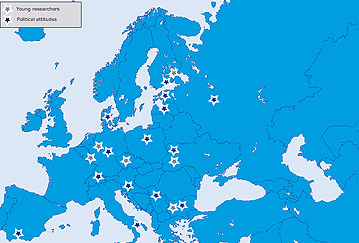![]() What attitudes do political, social and clerical organisations have towards nuclear energy?
What attitudes do political, social and clerical organisations have towards nuclear energy?
The task: Our task was to explore how the issues of “nuclear energy” and “energy supply” are covered by political parties, churches and non-governmental environmental organisations in various European countries.
The results: There are several general trends. Political parties on the right side of the spectrum tend to support the use of nuclear energy while left wing
parties are more likely to oppose it. Naturally, the Greens in any given country – whether as a party or as an NGO – form the most visible opposition to nuclear power. The Catholic and the Orthodox churches, in most of the examined cases, favour the peaceful use of nuclear power, while the Protestant church protests against it. There are many more NGOs – primarily those oriented towards ecology – gathering arguments against nuclear power plants (NPPs) than those advocating for them, the latter usually being highly specialized associations of physicists.
The platforms of these organisations shift according to a country’s general social climate. Even more interestingly, there seems to be a geographically related aspect: The inhabitants of eastern countries are more likely than those in the west to prefer that their electricity be produced in NPPs. This correlation may be explained by the missing post-Chernobyl discussion in former communist regimes or by their fear of being dependent on unreliable Russia for fossil fuels (even though some of these countries use Russian uranium and related technologies).

